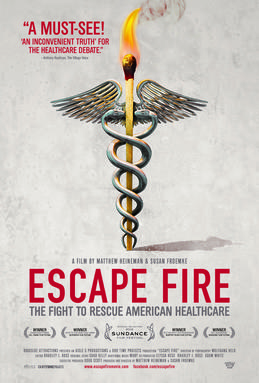Escape Fire: The Fight to Rescue American Healthcare
Escape Fire: The Fight to Rescue American Healthcare is a documentary film that addresses the critical issues facing the United States healthcare system. Directed by Matthew Heineman and Susan Froemke, the film explores the complexities of healthcare in the United States, highlighting the challenges of medical cost, access, and quality of care. Through a series of interviews with patients, healthcare professionals, and policy experts, Escape Fire seeks to illuminate the systemic problems of the healthcare system and propose potential solutions to ensure better health outcomes for all Americans.
Synopsis[edit | edit source]
Escape Fire: The Fight to Rescue American Healthcare examines the multifaceted problems of the American healthcare system. The title of the film is derived from the concept of an escape fire, a countermeasure technique used in wildfire fighting to create areas devoid of vegetation that can stop the spread of a wildfire. This metaphor is used to suggest that innovative solutions, akin to the escape fire, are needed to reform the healthcare system. The documentary critically analyzes the ways in which healthcare in the United States has become a profit-driven industry rather than a service-oriented one, leading to high costs, inefficiencies, and disparities in care.
The film features a range of perspectives, from a patient struggling with chronic illness and high medical costs to a military doctor implementing mindfulness and stress reduction techniques for treating PTSD. It also includes insights from renowned experts and advocates for healthcare reform, such as Don Berwick, former Administrator of the Centers for Medicare and Medicaid Services, and Andrew Weil, a proponent of integrative medicine.
Themes[edit | edit source]
Escape Fire delves into several key themes, including the unsustainable cost of healthcare, the over-reliance on pharmaceutical solutions, the need for preventive care, and the importance of a holistic approach to health. It argues that the current fee-for-service model incentivizes quantity over quality, leading to unnecessary treatments and interventions that do not necessarily improve patient outcomes. The film advocates for a shift towards a system that rewards preventive care and values the overall well-being of patients.
Reception[edit | edit source]
The documentary has been praised for its comprehensive examination of the healthcare system and its ability to present complex issues in an accessible manner. Critics have lauded the film for its compelling storytelling and its call to action for healthcare reform. However, some have noted that the film's ambitious scope sometimes leads to an oversimplification of complex issues.
Impact[edit | edit source]
Since its release, Escape Fire: The Fight to Rescue American Healthcare has sparked discussions among policymakers, healthcare providers, and the public about the need for systemic healthcare reform. It has been used as an educational tool in medical schools and public health programs to illustrate the challenges and opportunities within the American healthcare system.
Search WikiMD
Ad.Tired of being Overweight? Try W8MD's physician weight loss program.
Semaglutide (Ozempic / Wegovy and Tirzepatide (Mounjaro / Zepbound) available.
Advertise on WikiMD
|
WikiMD's Wellness Encyclopedia |
| Let Food Be Thy Medicine Medicine Thy Food - Hippocrates |
Translate this page: - East Asian
中文,
日本,
한국어,
South Asian
हिन्दी,
தமிழ்,
తెలుగు,
Urdu,
ಕನ್ನಡ,
Southeast Asian
Indonesian,
Vietnamese,
Thai,
မြန်မာဘာသာ,
বাংলা
European
español,
Deutsch,
français,
Greek,
português do Brasil,
polski,
română,
русский,
Nederlands,
norsk,
svenska,
suomi,
Italian
Middle Eastern & African
عربى,
Turkish,
Persian,
Hebrew,
Afrikaans,
isiZulu,
Kiswahili,
Other
Bulgarian,
Hungarian,
Czech,
Swedish,
മലയാളം,
मराठी,
ਪੰਜਾਬੀ,
ગુજરાતી,
Portuguese,
Ukrainian
Medical Disclaimer: WikiMD is not a substitute for professional medical advice. The information on WikiMD is provided as an information resource only, may be incorrect, outdated or misleading, and is not to be used or relied on for any diagnostic or treatment purposes. Please consult your health care provider before making any healthcare decisions or for guidance about a specific medical condition. WikiMD expressly disclaims responsibility, and shall have no liability, for any damages, loss, injury, or liability whatsoever suffered as a result of your reliance on the information contained in this site. By visiting this site you agree to the foregoing terms and conditions, which may from time to time be changed or supplemented by WikiMD. If you do not agree to the foregoing terms and conditions, you should not enter or use this site. See full disclaimer.
Credits:Most images are courtesy of Wikimedia commons, and templates Wikipedia, licensed under CC BY SA or similar.
Contributors: Prab R. Tumpati, MD

